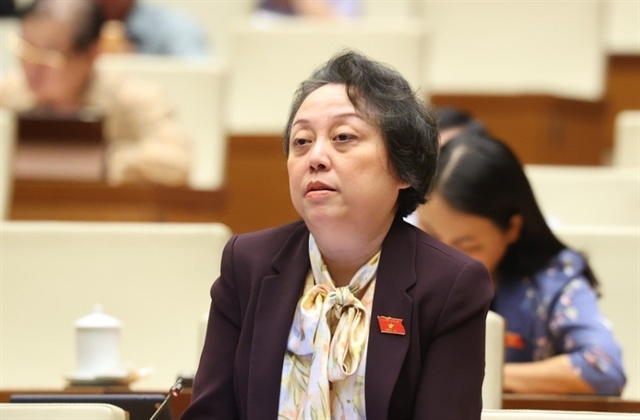.jpg) Society
Society

 |
| Phạm Khánh Phong Lan, NA deputy from HCM City. VNA/VNS Photo |
National Assembly (NA) deputy Phạm Khánh Phong Lan from the HCM City delegation spoke to Vietnamplus during the ongoing NA’s eighth session in Hà Nội about the draft of the revised Pharmacy Law.
How do you evaluate the draft of the revised draft?
I think the drafting committee has worked hard and the NA Social Committee's assessment report has thoroughly examined the issues.
However, I am not confident about the draft law’s content, as it does not adequately address the current situation.
Why do I have to say that? There are many proposed amendments but most of them only fix the tip of the iceberg, while leaving the root of the problem unresolved.
For example, the current drug supply is constantly facing problems such as shortages of drugs, vaccines and equipment. How can we solve those problems?
We have to conduct administrative reform to reduce the waiting time for drug registration code issuance. We can do that without legalising it because there is no law that allows us to prolong administrative procedures.
Administration reform has been mentioned repeatedly. We still have to line up, jostle each other for drug registration and still cannot issue registration numbers on time, not to mention the consequence of creating the risk of fostering "asking and giving" mechanisms.
Could you elaborate on the cause of the above situation?
There are 800 active components of various types and around 22,000 medication registration codes in Việt Nam.
This indicates that there are too many finished drugs.
In contrast, Singapore only has roughly 10,000 registration codes despite having 1,200 active compounds. In Japan, there are over 1,600 active compounds, yet fewer than 10,000 of them have registration codes.
Too many registration codes are being issued by us without any limitations.
To reduce the import of medications with an excessive number of registration codes, I believe we need a specific policy for imported medications.
The pharmaceutical industry will be held back if there are too many registration numbers, because there will be too many options, which will make bidding difficult and doctors will ultimately only bid based on price. The lower the price, the easier it is to win the bid, while high-quality products do not win the bid.
In addition to the registration code, how can we meet the demand for drugs?
This is an issue related to the development of the pharmaceutical industry.
In the revised Pharmacy Law, we set out a number of provisions on priorities and subsidies but I see that these are almost repetitions of the revised Pharmacy Law 2016.
We have been a market economy and in fact, Việt Nam has 168 good manufacturing practice-standard factories since the enforcement of the Pharmacy Law 2016.
To date, that number has increased to 236 factories.
Việt Nam does not lack pharmaceutical factories, while neighbouring countries such as the Philippines have only just over 100 factories.
If we look into the actual situation, we will see that almost all factories have the problem of not producing enough of their initial registered capacity.
When they produce a lot of drugs and can’t find an outlet, they will lose the bidding in the domestic market.
Following the parameters on the stock exchange today, we can see that almost all the big names in the Vietnamese pharmaceutical industry have been invested by or taken over by foreign investors.
Therefore, our two policies are contradictory. On the one hand, we want to ensure pharmaceutical security, keep that right for domestic Vietnamese pharmaceutical companies, yet, on the other hand, many businesses with foreign capital still operate in the Vietnamese market.
Could you point out shortcomings of the current pharmaceutical distribution system in Việt Nam?
In Việt Nam's pharmaceutical distribution system, there are tens of thousands of wholesale distribution companies and retail pharmacies, but there are no effective management measures.
There remains the sale of drugs without prescriptions at pharmacies, fake drugs and poor quality drugs in densely populated areas. Meanwhile, in remote, mountainous and island areas, there is still a shortage of drugs. These issues lead to an increase in the number of intermediaries, making drug prices difficult to control.
I predict that if we continue enforcing the revised Pharmacy Law in its current form, the result will be the same as the 2016 law, with more shortcomings expected.
The field of pharmacy also covers cosmetics and food supplements.
We lack specific, direct legal regulations to manage cosmetics and food supplements, even though these products are widespread, directly impact public health, and face many problems.
What changes needed to make in the development of the current pharmaceutical industry?
The pharmaceutical businesses need investment plans to grow, but the legislation must be explicit.
Our policy must focus on developing the pharmaceutical industry, not simply making drugs cheaper, as lower prices could not assure quality.
I should stress that it will be extremely challenging to manage an active ingredient when hundreds of registration numbers are vying for the same spot.
We can learn from other nations' experiences. The pharmaceutical industry is never an open market, we shouldn't become a low-lying region of the world and permit the importation of various medications, which will ultimately cause the market to become unmanageable and chaotic.
We are making efforts together, but every time we fix something, it is challenging. This is our responsibility to the people and to the industry's development. We see that the shortcomings remain unresolved. If we continue on this path, we will have to pay the price later. VNS




